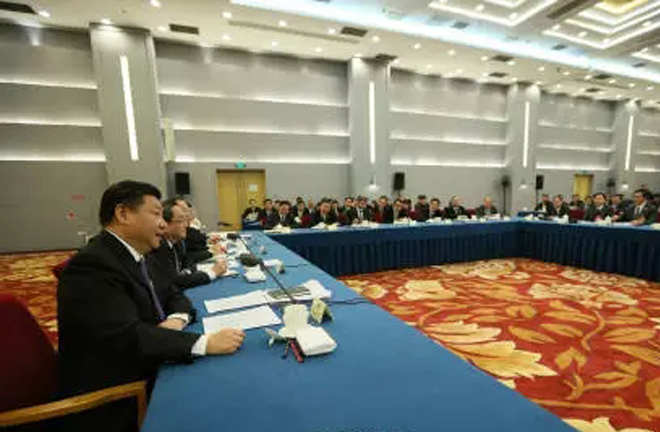CHENG CHEN: Government must forge new type of relationship with private enterprises

On March 4, 2016, Chinese President Xi Jinping joined a panel discussion with political advisors from the China Democratic National Construction Association and the All-China Federation of Industry and Commerce during the Fourth Session of the 12th National Committee of the Chinese People’s Political Consultative Conference.
On March 4, 2016, Chinese President Xi Jinping joined a panel discussion with political advisors from the China Democratic National Construction Association and the All-China Federation of Industry and Commerce during the Fourth Session of the 12th National Committee of the Chinese People’s Political Consultative Conference. He offered a standard definition of the new type of government-business relations, which highlights the principles of sincerity and honesty.
Sincerity in the new type of government-business relations not only exemplifies the people-oriented concept in traditional Chinese culture but also contains the idea of participation in modern national governance.
Deeply rooted in China’s traditional political ethics, the people-oriented concept stresses that leaders should attach importance to public interests in economy, administration and culture. This is just in accord with what Xi said: Sincerity means government officials should be magnanimous in their dealings with private business owners, and help them resolve practical problems.
The modernization of national governance requires leaders to not only pursue public interests but also mobilize social forces, integrate governance resources and absorb external information and wisdom. In recent years, the participatory governance mechanism has effectively promoted smooth expression of social opinions, sufficient collection of decision-making information and wide participation of the public.
China has implemented a basic economic system, with public ownership playing a dominant role and diverse forms of ownership coexisting, to foster the growth of non-public economy. With their wealth of professional knowledge and practical experience, industrial and commercial executives can play an important role in the construction of a participatory common governance mechanism in the economic field. For private entrepreneurs, sincerity means an obligation to give their honest opinions when communicating with government officials, Xi said.
Honesty in the new type of government-business relations emphasizes that the forces of capital have “captured” public power in foreign countries, leading to the failure of the liberal democratic system. It also shows the unique advantages of China’s socialist market economic system.
In the West, the extreme imbalance that is evident in social power structures has severely disrupted the democratic system. The majority cannot counter the strength of capital through the democratic system and rule of law. Social cohesion is constantly breaking up while economic and social functions of state institutions are being reduced. This results from the lack of necessary segregation between capital forces and public power. By various means, capital forces have captured officials who exert public power.
China should avoid similar risks from improper government-business relations. Elaborating on the connotations of honesty, Xi said it refers to the fact that government officials need to be transparent and ethical to stamp out excessive greed. Abuse of power is strictly prohibited. At the same time, private entrepreneurs should tell the truth, offer advice and operate businesses according to the law. Self-regulation on both sides will prevent the dishonest combination of capital forces and public power.
Though similar risks may exist to some extent, China’s socialist political and economic system rein them by using structural constraints on a macroeconomic level. The basic economic system has determined the socialist nature of China’s market economy. The economic lifeline, which is of great significance to social and economic development, is controlled under public ownership. Thus, the imbalance of social power in Western countries will not occur in this country. In addition, the country’s fundamental political system endows the National People’s Congress with supreme power, and the country is under the leadership of the sole ruling Party. This eliminates the possibility that mighty capital forces could control national policies.
In recent years, Western scholars have heatedly discussed the “China model.” Holding various opinions about China’s successful experience, they have reached consensus on the enormous function of the political and economic system with Chinese characteristics.
From an overall perspective, China’s socialist political and economic system has unique advantages. The phenomenon of massive structural “government failure” in the West will never happen in this country. Individually, all Party members and cadres who exert public power should strictly regulate their own behaviors. Dealing with government-business relations, they must keep in mind the word “honesty” and set necessary boundaries between power and capital. Only by containing the spread of corruption from individuals to groups can the construction of a clean and honest government be possible and the anti-corruption campaign be successful.
Cheng Chen is from the Party Literature Research Office of the Central Committee of the Communist Party of China.
